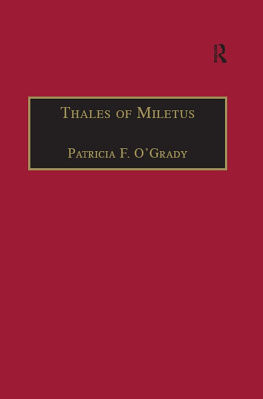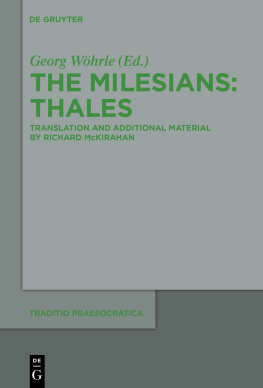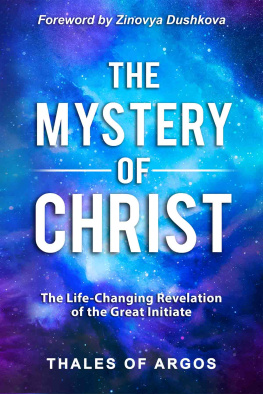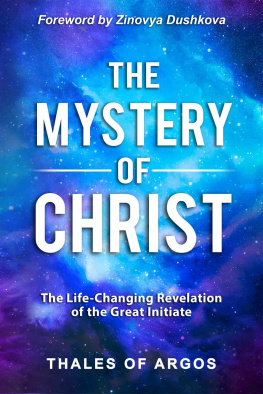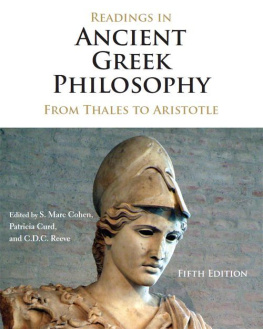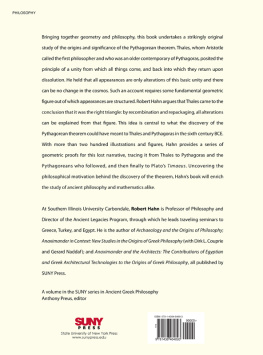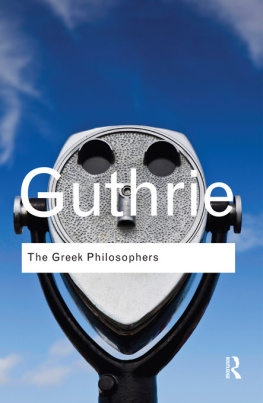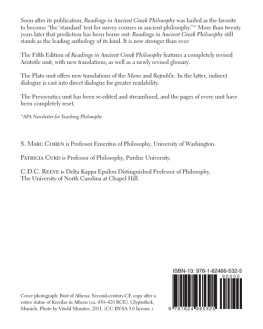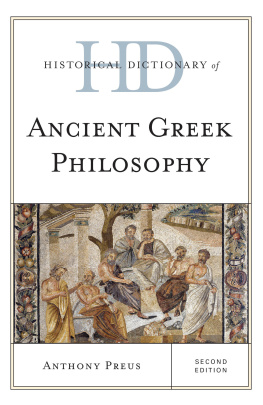THALES OF MILETUS
Western Philosophy Series
Edited by:
Jan Srzednicki, La Trobe University, AustraliaEditors: Roberto Poli, Trento University, Italy, S.J. Surma, Auckland University, New Zealand, David Wood, University of Melbourne, AustraliaEditorial Advisory Board: Maria Baghramian, University College, Dublin, L.M. Broughton, Cambridge University, Max Cresswell, Victoria University, Wellington, Ivor Grattan-Guiness, Middlesex University, Dale Jacquette, Penn State University, Jacek Jadacki, University of Warsaw, John Passmore, National University, Canberra, J. Perzanowski, Nicholas Copernicus University, Torun, Graham Priest, University of Melbourne, Australia, Jean Pettitot, CREA, Paris, Anthony Quinton, Oxford University, J. Sebestic, University of Paris, Peter Simons, University of Leeds, Dallas Willard, University of Southern California, Jan Wolenski, Jagiellonian University, Crakow, Rudolf Ziedins, Waikato University, New Zealand, Ewa Zarnecka, Jagiellonian University, Crakow
The Western Philosophy Series develops from the Nijhoff International Philosophy series originally published by Kluwer and previously entitled the Melbourne International Philosophy series. The new series continues to uphold the policy of presenting works in the tradition of exact, or scientific philosophy based firmly in solid argument and strictest possible proof. The series continues a tradition of publishing titles concerned with prominent philosophers and includes collective editions of great logicians: the NIP series began with the Lesniewski Collection (Vols 13, 24, 44, 54), and the Collected Works of Jan Lukasiewicz are now in preparation.
Titles published in the Western Philosophy Series
(series volume numbers correspond to the original NIP series)
The Brentano Puzzle, edited by R. Poli, 1998 ISBN 1 84014 371 1 (vol 55) Sociative Logics and their Applications: Essays by the Late Richard Sylvan, edited by D. Hyde and G. Priest, 2000 ISBN 0 7546 1127 2 (vol 56) The School of Alexius Meinong, edited by Liliana Albertazzi, Dale Jacquette and Roberto Poli, 2001 ISBN 1 84014 374 6 (vol 57) Thales of Miletus: The beginnings of western science and philosophy, Patricia F. OGrady, ISBN 0 7546 0533 7 (vol 58)
Thales of Miletus
The beginnings of western science and philosophy
PATRICIA F. OGRADY
Flinders University of South Australia

First published 2002 by Ashgate Publishing
Published 2016 by Routledge
2 Park Square, Milton Park, Abingdon, Oxon OX14 4RN
711 Third Avenue, New York, NY 10017, USA
Routledge is an imprint of the Taylor & Francis Group, an informa business
Copyright Patricia F. OGrady 2002
Patricia F. OGrady has asserted her moral right under the Copyright, Designs and Patents Act, 1988, to be identified as the author of this work.
All rights reserved. No part of this book may be reprinted or reproduced or utilised in any form or by any electronic, mechanical, or other means, now known or hereafter invented, including photocopying and recording, or in any information storage or retrieval system, without permission in writing from the publishers.
Notice:
Product or corporate names may be trademarks or registered trademarks, and are used only for identification and explanation without intent to infringe.
British Library Cataloguing in Publication Data
OGrady, Patricia F
Thales of Miletus : the beginnings of Western science and philosophy. (Western philosophy series)
1. Thales, of Miletus 2. Philosophers Greece Biography 3. Philosophy and science
I. Title
Library of Congress Control Number: 2002100373
ISBN 13: 978-0-7546-0533-1 (hbk)
Contents
Thales of Miletus is a wonderful figure for the progenitor of philosophy. A colossus of the practical and scientific intellect, he stands with one foot in the light of historical fact, and the other in the mist of legend. Nearly everything reported to us about Thales, including the account of his own beginnings, presents a token of the familiar with a tinge of the strange. He was a speaker of Greek and citizen of Miletus, but his ancestry may have been Phoenician and included Cadmus and Agenor. He was universally regarded as one of the Seven Sages, but we have no very specific account of what that meant, or exactly who all the others were. He gave practical advice of inestimable value to kings, cities, navigators, fishermen, and even ordinary people, yet he seems to have been prone to falling into wells. He was the first to take a naturalistic view of the world and suppose that a material principle, water, was the source of all things, but he also said that all things are full of gods. Without the help of any teachers, he marked the solstices, measured the stars, and predicted, to the year, an eclipse of the sun that took place in 585 BCE or, he may have learned the geometric lore that underlay astronomy when he travelled in Egypt and lived with the priests there.
Thales is a fascinating man, deserving of our fascination. Yet until now there has been no book about Thales readily available in any language, and precious little even of essay, chapter or article in English. One might suppose this is no accident. It could be argued that the material on Thales is too scanty, or too conjectural, or too contradictory to warrant a monograph. So it could be argued, but it would be a bad argument. For there are plenty of philosophers who have received more exhaustive treatment than Thales for whom our evidence is scant (e.g. Leucippus), or conjectural (Pythagoras), or contradictory (Empedocles). And besides, to speak absolutely, the material on Thales is clearly sufficient (as the present volume proves); there is much conjecture, admittedly, but why should we not acknowledge it and make the most of it? And even the contradictions can be resolved, to a point, so why should we not see how much resolution we can get? Especially as Thales stands at the beginning of philosophy and science, we are warranted in seeking a full and careful account of all the evidence concerning his activities.
Fortunately for us, Patricia OGrady never wavered in her fascination with Thales or her determination to consider the evidence thoroughly and reasonably. And we are more fortunate than that. From the very beginning of this delightful book, we are drawn into the orb of Milesian philosophy, so as to wonder along with Thales about the earth and the sea, about the sun and the stars, about calculation and geometry. This is human wonderment, natural and homely. OGrady does not torture us with grandiose speculation about how alien the Greeks were, or how far the Greek mind towered above our own. There is no nostalgia for the lost, the forgotten, the unsalvageable glory that was pre-Socratic philosophy. OGrady shows her respect for Thales and her admiration of his accomplishments by treating him as a human being.
The straightforward plan and arrangement of this book gives little indication of the difficulties involved in sorting and prioritizing the source material. The decision to treat Thaless contribution to natural philosophy first, astronomy second, and mathematics third shows a clear sense of his most important and lasting contribution. It also shows an appreciation of both the value and, I would argue, the necessity of the Aristotelian tradition (i.e. the work of Aristotle and all the doxographers who depend, ultimately, on him). For, in addition to some well-known attempts to recover the pre-Socratics from beneath the Aristotelian prejudices, scholars at the end of the last century made significant efforts to downplay the Aristotelian tradition. But both approaches are ill-advised. It is as if we were to approach the restoration of a painting with the idea that we must remove both any varnishes or glues that had been laid down over the images,
Next page
